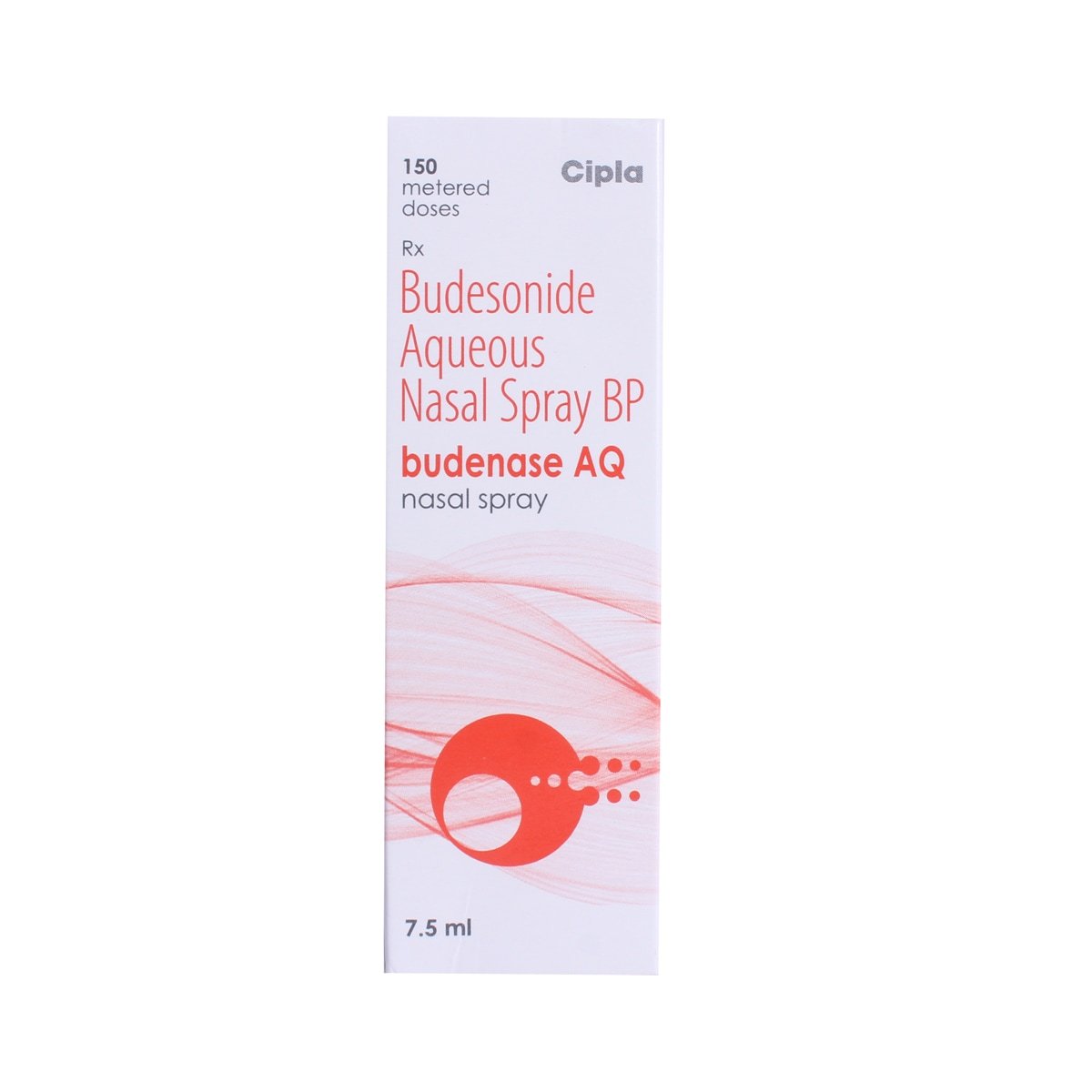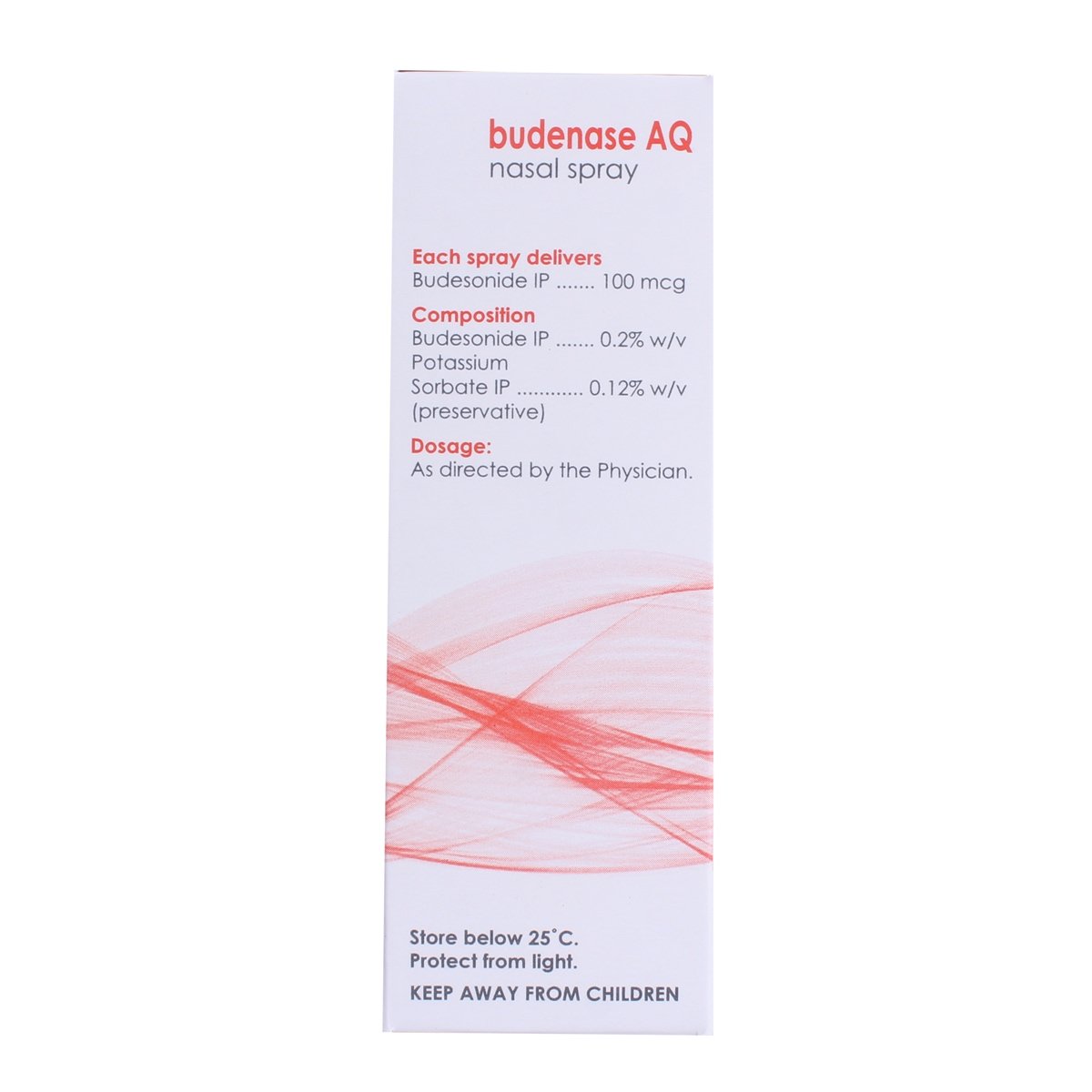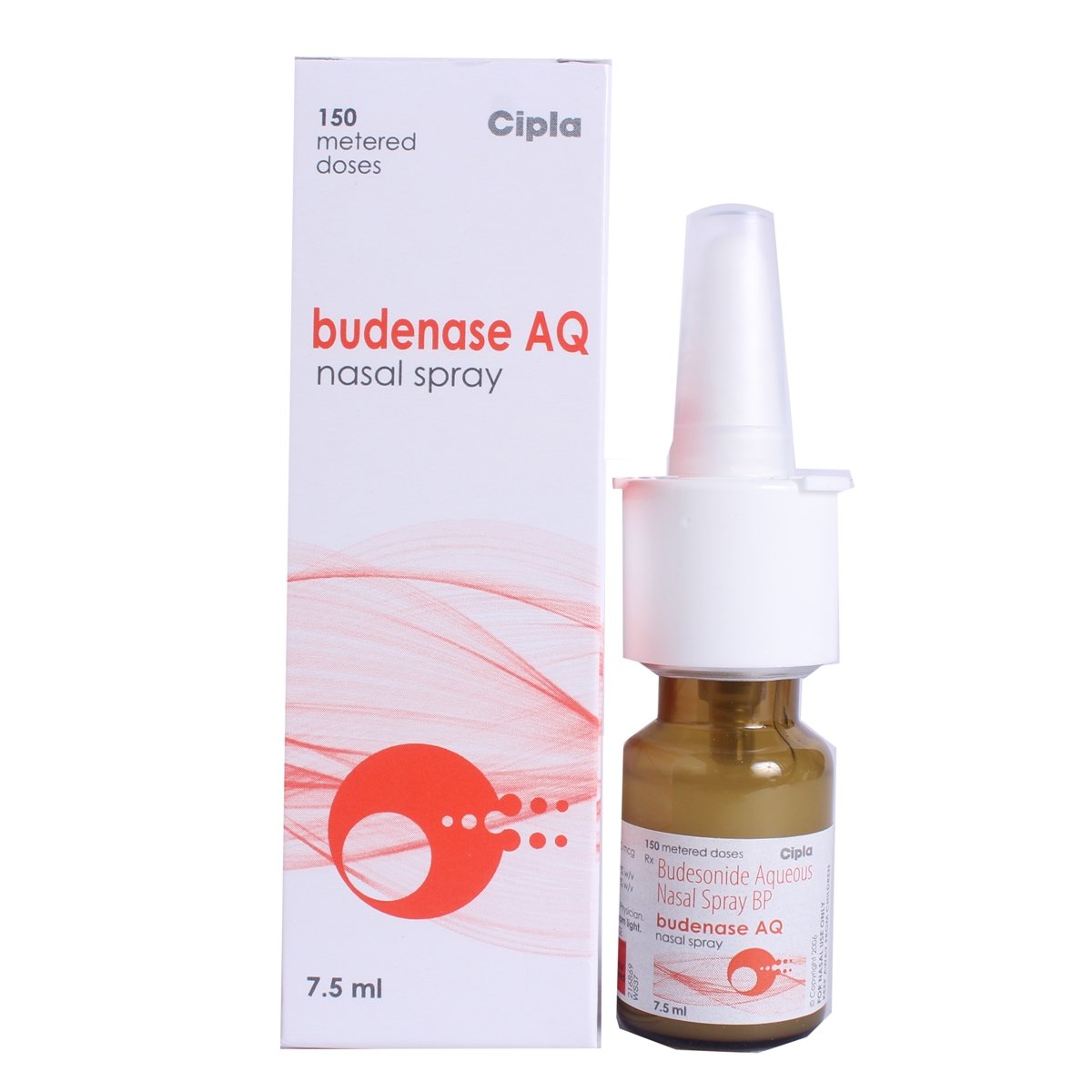Budenase AQ Nasal Spray 150 MDI






MRP ₹127.5
(Inclusive of all Taxes)
₹19.1 Cashback (15%)
Provide Delivery Location
Online payment accepted
 Prescription drug
Prescription drugWhats That
Composition :
Manufacturer/Marketer :
Consume Type :
Expires on or after :
Return Policy :
About Budenase AQ Nasal Spray 15
Budenase AQ Nasal Spray 15 belongs to the class of medicines called 'glucocorticosteroids' used to relieve symptoms of seasonal or year-round allergic rhinitis/hay fever. It treats allergy symptoms, such as runny nose, sneezing, itchy eyes, nose, and throat. Allergic rhinitis is inflammation and allergy of the nose caused by an allergen, such as pollen, dust, mould, or skin flakes from certain animals.
Budenase AQ Nasal Spray 15 contains 'Budesonide' that works by blocking the release of certain chemical messengers involved in allergic and non-allergic-mediated inflammation. Thereby, it helps treat inflammatory diseases. It relieves nasal and sinus congestion, mucus production, and nasal swelling caused by allergic rhinitis.
Your doctor will decide the dosage of Budenase AQ Nasal Spray 15 based on your medical condition. The common side effects of Budenase AQ Nasal Spray 15 include nose/throat dryness, coughing, sneezing, nosebleeds, and unpleasant taste and smell. Most of these side effects of Budenase AQ Nasal Spray 15 do not require medical attention and gradually resolve over time. However, if the side effects are persistent, please consult your doctor.
Inform your doctor if you have/had any allergic reactions to budesonide or any other medications. Brief your medical history to the doctor if you have any heart, liver or kidney diseases, glaucoma, cataracts, tuberculosis, and nasal problems before taking Budenase AQ Nasal Spray 15. Check with your doctor before starting Budenase AQ Nasal Spray 15 if you are pregnant or breastfeeding. Budenase AQ Nasal Spray 15 should be used in children above six years of age only when advised by a doctor.
Uses of Budenase AQ Nasal Spray 15
Directions for Use
Key Benefits
Budenase AQ Nasal Spray 15 treats allergy symptoms in seasonal allergies and allergic rhinitis. It consists of 'Budesonide' that works by blocking the release of certain chemical messengers involved in allergic and non-allergic-mediated inflammation. Thereby, it helps treat inflammatory diseases. It relieves nasal and sinus congestion, mucus production, and nasal swelling caused by allergic rhinitis. It also makes the nasal passages less sensitive to allergic triggers like pollen, animal dander or dust mites.
Storage
- Skin rash caused by allergies is due to irritants or allergens. Therefore, avoid contact with such irritants.
- Consult your doctor for proper medication and apply an anti-itch medication. Follow the schedule and use the medication whenever needed.
- Protect your skin from extreme heat and try to apply wet compresses.
- Soak in the cool bath, which gives a soothing impact to the affected area.
- Report the itching to your doctor immediately; they may need to change your medication or dosage.
- Use a cool, damp cloth on the itchy area to help soothe and calm the skin, reducing itching and inflammation.
- Keep your skin hydrated and healthy with gentle, fragrance-free moisturizers.
- Try not to scratch, as this can worsen the itching and irritate your skin.
- If your doctor prescribes, you can take oral medications or apply topical creams or ointments to help relieve itching.
- Track your itching symptoms and follow your doctor's guidance to adjust your treatment plan if needed. If the itching persists, consult your doctor for further advice.
- Using a cold compress may help relieve itching and inflammation associated with conjunctivitis.
- A warm compress and washing the eyes with water can help with crusting on the eyelids.
- Avoid wearing contact lens until you feel better; use spectacles instead.
- Do not rub the eyes.
- Practise good hand hygiene and avoid touching the eyes to prevent the spread of infection.
- If you experience nosebleeds or unusual bleeding after taking medication, seek medical attention right away and schedule an appointment to discuss your symptoms with your doctor.
- Your doctor may adjust your treatment plan by changing the dosage, switching to a different medication, or stopping the medication.
- If your doctor advises, take steps to manage bleeding and promote healing, such as applying pressure, using saline nasal sprays, or applying a cold compress, using humidifiers, avoiding blowing or picking your nose, and applying petroleum jelly to the nostrils.
- Schedule follow-up appointments with your doctor to monitor progress, adjust treatment plans, and prevent future episodes.
- To keep your vocal cords lubricated and hydrated, drink lots of water.
- Suck on ice chips, popsicles, or lozenges to clear your throat and reduce hoarseness.
- Your voice cords may be soothed and healed by honey's antibacterial and anti-inflammatory properties.
- Gargle with salt water.
- Using a steam humidifier or inhaling steam might help minimize hoarseness and release mucus.
Drug Warnings
Please inform your doctor if you use any prescription, or non-prescription medicines, including vitamin and herbal supplements, before using Budenase AQ Nasal Spray 15. Let your doctor know if you have a recent history of heart, liver or kidney diseases, glaucoma, cataracts, tuberculosis, nasal surgery, and chronic nasal inflammation before starting Budenase AQ Nasal Spray 15. Pregnant and breastfeeding women should use Budenase AQ Nasal Spray 15 with proper consultation and caution. Budenase AQ Nasal Spray 15 is recommended in children above six years of age only with a doctor's advice.
Drug-Drug Interactions
Drug-Drug Interactions
Login/Sign Up
Using mifepristone together with Budenase AQ Nasal Spray 150 MDI may significantly reduce the effects of Budenase AQ Nasal Spray 150 MDI.
How to manage the interaction:
Taking Budenase AQ Nasal Spray 150 MDI with Mifepristone is not recommended as it can cause an interaction, but it can be taken if prescribed by the doctor. Do not stop using any medications without talking to a doctor.
Coadministration of Budenase AQ Nasal Spray 150 MDI and Ribociclib may increase the absorption of the medication from Budenase AQ Nasal Spray 150 MDI into the blood stream.
How to manage the interaction:
Taking Ribociclib with Budenase AQ Nasal Spray 150 MDI can cause an interaction, consult a doctor before taking it. Consult a doctor if experience swelling, weight gain, high blood pressure, high blood glucose, muscle weakness, depression, acne, thinning skin, stretch marks, easy bruising, bone density loss, cataracts, menstrual irregularities, excessive growth of facial or body hair, and abnormal distribution of body fat, especially in the face, neck, back, and waist. Do not stop using any medications without talking to a doctor.
When Budenase AQ Nasal Spray 150 MDI is used with teriflunomide, the risk of severe infections increases.
How to manage the interaction:
Co-administration of Budenase AQ Nasal Spray 150 MDI along with teriflunomide can lead to an interaction, it can be taken if recommended by a doctor. However, if you develop a fever, chills, diarrhea, sore throat, muscular pains, shortness of breath, blood in sputum, weight loss, red or irritated skin, body sores, or discomfort or burning during urination, consult a doctor as soon as possible. Do not discontinue any medications without consulting a doctor.
Taking Budenase AQ Nasal Spray 150 MDI with Vigabatrin, especially for a prolonged period of time, may raise the chance of significant adverse effects (loss of vision).
How to manage the interaction:
Co-administration of Budenase AQ Nasal Spray 150 MDI along with Vigabatrin can lead to an interaction, it can be taken if recommended by a doctor. Regular eye check ups are advised. Do not discontinue any medications without consulting a doctor.
When Budenase AQ Nasal Spray 150 MDI is taken with Cobicistat, may considerably enhance Budenase AQ Nasal Spray 150 MDI absorption into the bloodstream which may lead to side effects.
How to manage the interaction:
Co-administration of Budenase AQ Nasal Spray 150 MDI along with cobicistat can lead to an interaction, it can be taken if recommended by a doctor. However, if you experience swelling, weight gain, high blood pressure, high blood glucose, muscle weakness, depression, acne, thinning skin, stretch marks, easy bruising, bone density loss, vision problems, menstrual irregularities, excessive growth of facial or body hair, and abnormal distribution of body fat, especially in the face, neck, back, and waist, infections, a severe asthma attack, consult the doctor immediately. Do not stop using any medications without talking to a doctor.
Coadministration of itraconazole and Budenase AQ Nasal Spray 150 MDI may significantly increase the blood levels of Budenase AQ Nasal Spray 150 MDI.
How to manage the interaction:
Despite the possibility of an interaction, Budenase AQ Nasal Spray 150 MDI and itraconazole can be used if a doctor prescribes them. Consult a doctor if have high blood pressure, high blood sugar, muscular weakness, depression, acne, stretch marks, easy bruising, loss of bone density, cataracts, swelling of legs or hands, irregular menstruation, or excessive development of hair on face or body development of hair. Never stop taking any medications without talking to a doctor.
Using baricitinib together with Budenase AQ Nasal Spray 150 MDI may increase the risk of serious infections.
How to manage the interaction:
Taking Budenase AQ Nasal Spray 150 MDI along with baricitinib can lead to an interaction, it can be taken if recommended by a doctor. If you experience fever, chills, diarrhea, sore throat, muscular pains, shortness of breath, blood in sputum, weight loss, red or irritated skin, body sores, and discomfort or burning while urinating, severe stomach pain, nausea, or vomiting, consult a doctor. Do not discontinue any medication without consulting a doctor.
When Budenase AQ Nasal Spray 150 MDI is used with fingolimod, the risk of severe infections increases.
How to manage the interaction:
Co-administration of Budenase AQ Nasal Spray 150 MDI along with fingolimod can lead to an interaction, it can be taken if recommended by a doctor. However, if you develop a fever, chills, diarrhea, sore throat, muscular pains, shortness of breath, blood in sputum, weight loss, red or irritated skin, body sores, or discomfort or burning during urination, consult the doctor as soon as possible. Do not discontinue any medications without consulting a doctor.
When Budenase AQ Nasal Spray 150 MDI is taken with Idelalisib, may considerably enhance Budenase AQ Nasal Spray 150 MDI absorption into the bloodstream which may lead to side effects.
How to manage the interaction:
Co-administration of Budenase AQ Nasal Spray 150 MDI along with Idelalisib can lead to an interaction, it can be taken if recommended by a doctor. However, if you experience swelling, weight gain, high blood pressure, high blood glucose, muscle weakness, depression, acne, thinning skin, stretch marks, easy bruising, bone density loss, vision problems, menstrual irregularities, excessive growth of facial or body hair, and abnormal distribution of body fat, especially in the face, neck, back, and waist, infections, a severe asthma attack, consult the doctor immediately. Do not stop using any medications without talking to a doctor.
When Budenase AQ Nasal Spray 150 MDI is taken with Nefazodone, may considerably enhance Budenase AQ Nasal Spray 150 MDI absorption into the bloodstream which may lead to side effects.
How to manage the interaction:
Co-administration of Budenase AQ Nasal Spray 150 MDI along with Nefazodone can lead to an interaction, it can be taken if recommended by a doctor. However, if you experience swelling, weight gain, high blood pressure, high blood glucose, muscle weakness, depression, acne, thinning skin, stretch marks, easy bruising, bone density loss, vision problems, menstrual irregularities, excessive growth of facial or body hair, and abnormal distribution of body fat, especially in the face, neck, back, and waist, infections, a severe asthma attack, consult the doctor immediately. Do not stop using any medications without talking to a doctor.
Drug-Food Interactions
Drug-Food Interactions
Login/Sign Up
Diet & Lifestyle Advise
- Know your triggers like allergens, such as pollen, dust, and food items that make your asthma and other respiratory diseases severe.
- Quit smoking and avoid passive smoking.
- Drink extra fluids while you take Budenase AQ Nasal Spray 15. This helps loosen congestion and lubricate the throat.
- Eat a healthy diet and exercise regularly to strengthen your breathing muscles and boost your immune system.
- Learning breathing exercises will help you move more air in and out of your lungs.
- Avoid cold foods and drinks to ease your nasal congestion.
Side Effects of Budenase AQ Nasal Spray 15
- Nose/throat dryness
- Coughing
- Sneezing
- Nosebleeds
- Unpleasant taste and smell
Habit Forming
Therapeutic Class
All Substitutes & Brand Comparisons
Author Details
We provide you with authentic, trustworthy and relevant information
Drug-Diseases Interactions
Drug-Diseases Interactions
Login/Sign Up
FAQs
Budenase AQ Nasal Spray 15 works by blocking the release of certain chemical messengers involved in allergic and non-allergic-mediated inflammation. It also makes the nasal passages less sensitive to allergic triggers like pollen, animal dander or dust mites.
Do not stop using Budenase AQ Nasal Spray 15 even if you feel better, as it may worsen your condition. However, if you experience any difficulty while using Budenase AQ Nasal Spray 15, please consult a doctor.
Take the missed dose of Budenase AQ Nasal Spray 15 as soon as you remember. However, if it is time for the next dose, skip the missed dose and return to your regular dosing schedule. Do not double the dose.
It is advised not to share Budenase AQ Nasal Spray 15 with another person to avoid spreading infections. Also, to prevent contamination, please do not use the spray bottle after 28-30 days of opening it.
Unlike other anti-allergic medicines, Budenase AQ Nasal Spray 15 does not cause drowsiness or sedation, thus making it easier to administer.
Drug-Drug Interactions Checker List
- PREDNISOLONE
Special Advise
If you do not notice any improvement in your condition after using Budenase AQ Nasal Spray 15 for 5-7 days, please reach out to your doctor.
Disease/Condition Glossary
Allergic rhinitis: It is inflammation and allergy of the nose caused by an allergen, such as pollen, dust, mould, or flakes of skin from certain animals. It is also known as hay fever. Its symptoms include itchy, watery eyes, itchy nose, sneezing, and runny nose. Medications that treat allergic rhinitis include steroid drugs, anti-histamine medications, decongestants, and bronchodilators.

Have a query?
Buy best Ear, Nose & Oropharynx products by
Entod Pharmaceuticals Ltd
Cipla Ltd
NuLife Pharmaceuticals
Nri Vision Care India Ltd
Lincoln Pharmaceuticals Ltd
Glenmark Pharmaceuticals Ltd
Macleods Pharmaceuticals Ltd
Pristine Pearl Pharma Pvt Ltd
Centaur Pharmaceuticals Pvt Ltd
Dr Reddy's Laboratories Ltd
Lupin Ltd
Zydus Healthcare Ltd
Indoco Remedies Ltd
Intas Pharmaceuticals Ltd
Mankind Pharma Pvt Ltd
GlaxoSmithKline Pharmaceuticals Ltd
Leeford Healthcare Ltd
Megma Healthcare Pvt Ltd
Sapient Laboratories Pvt Ltd
Sun Pharmaceutical Industries Ltd
Zuventus Healthcare Ltd
Zydus Cadila
Auskincare Formualation Pvt Ltd
Alkem Laboratories Ltd
Bell Pharma Pvt Ltd
Chethana Pharmaceuticals
Dwd Pharmaceuticals Ltd
German Remedies Ltd
Kaizen Drugs Pvt Ltd
Torque Pharmaceuticals Pvt Ltd
Vilco Laboratories Pvt Ltd
Avilius Neutracare
Biochem Pharmaceutical Industries Ltd
Blubell Pharma
Delcure Life Sciences Ltd
Eris Life Sciences Ltd
Kavach 9 Pharma & Research Pvt Ltd
Medishri Healthcare Pvt Ltd
NVK Pharma
Optho Remedies Pvt Ltd
Ordain Health Care Global Pvt Ltd
Respionix Healthcare Pvt Ltd
Troikaa Pharmaceuticals Ltd
Xseed Pharma
Abbott India Ltd
Atopic laboratories Pvt Ltd
Cadila Pharmaceuticals Ltd
Clyde Pharmaceutical Pvt Ltd
East India Pharmaceutical Works Ltd
FDC Ltd
Incus Pharmaceuticals Pvt Ltd
Meridian Enterprises Pvt Ltd
Micro Labs Ltd
Morepen Laboratories Ltd
Nextgen Healthcare
Novalab Healthcare Pvt Ltd
Ocuris Pharmaceuticals Pvt Ltd
Precept Pharma
Salvador Visiontech Pvt Ltd
Sunways (India) Pvt Ltd
Timon Pharmaceuticals Pvt Ltd
Unison Pharmaceuticals Pvt Ltd
Aar Ess Remedies Pvt Ltd
Adley Formulations
Ajanta Pharma Ltd
Alercon Pharma Pvt Ltd
Apex Laboratories Pvt Ltd
Aver Pharmaceuticals Pvt Ltd
BMW Pharmaco India Pvt Ltd
Bio Warriors Pharmaceucticals Pvt Ltd
Casca Remedies Pvt Ltd
Elan Pharma India Pvt Ltd
Elivia Life Sciences Pvt Ltd
Elkos Healthcare Pvt Ltd
Floreat Medica Pvt Ltd
Healthgate Pvt Ltd
Ikon Remedies Pvt Ltd
Ipca Laboratories Ltd
Koye Pharmaceuticals Pvt Ltd
Lividus Pharmaceuticals Pvt Ltd
Orn Remedies Pvt Ltd
Rosa Lifesciences
Siloam Pharmaceuticals Pvt Ltd
Sitnez Biocare Pvt Ltd
Srigan Anatto Care Pvt Ltd
Uniza Healthcare Llp
Vatican Life Sciences Pvt Ltd
Welgenic Pharma
Wellok Pharma
West Coast Pharmaceuticals Pvt Ltd
Win Medicare Ltd
Zee Laboratories Ltd
Abyss Pharma Pvt Ltd
Accent Pharmaceuticals & Diagnostics
Alembic Pharmaceuticals Ltd
Alencure Biotech Pvt Ltd
Austere
Bacans Biotech Pvt Ltd
Biopolis Life Sciences Pvt Ltd
Biosys Medisciences
Alcohol
Safe if prescribed
It is unknown whether it is safe to consume alcohol with Budenase AQ Nasal Spray 15. Please consult your doctor if you have any concerns.
Pregnancy
Consult your doctor
There is limited data on how Budenase AQ Nasal Spray 15 affects pregnancy. Please consult your doctor before using Budenase AQ Nasal Spray 15 if you are pregnant or planning to conceive.
Breast Feeding
Consult your doctor
There is limited data on how Budenase AQ Nasal Spray 15 affects breastfeeding. Please consult your doctor before starting Budenase AQ Nasal Spray 15 if you are a nursing mother.
Driving
Safe if prescribed
Budenase AQ Nasal Spray 15 does not affect your ability to drive. However, if you experience unmanageable symptoms, do not drive or operate machinery until you feel better and focused.
Liver
Consult your doctor
Budenase AQ Nasal Spray 15 should be used with caution in patients with liver disease. Let your doctor know if you have any history of liver disease.
Kidney
Consult your doctor
Budenase AQ Nasal Spray 15 should be used with caution in patients with kidney disease. Let your doctor know if you have any history of kidney disease.
Children
Safe if prescribed
Budenase AQ Nasal Spray 15 is recommended in children above six years of age only with a doctor's advice.





